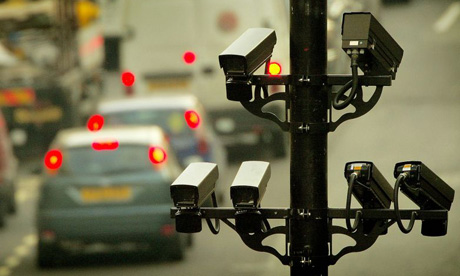- The Guardian,
- Monday September 15 2008

CCTV cameras, converted to read ANPR data, capturing people’s movement. Photograph: Peter Macdiarmid/Reuters
The police are to expand a car surveillance operation that will allow them to record and store details of millions of daily journeys for up to five years, the Guardian has learned.
A national network of roadside cameras will be able to "read" 50m licence plates a day, enabling officers to reconstruct the journeys of motorists.
Police have been encouraged to "fully and strategically exploit" the database, which is already recording the whereabouts of 10 million drivers a day, during investigations ranging from counter-terrorism to low-level crime.
But it has raised concerns from civil rights campaigners, who question whether the details should be kept for so long, and want clearer guidance on who might have access to the material.
The project relies on automatic number plate recognition (ANPR) cameras to pinpoint the precise time and location of all vehicles on the road. Senior officers had promised the data would be stored for two years. But responding to inquiries under the Freedom of Information Act, the Home Office has admitted the data is now being kept for five years.
Thousands of CCTV cameras across the country have been converted to read ANPR data, capturing people's movements in cars on motorways, main roads, airports and town centres.
Local authorities have since adapted their own CCTV systems to capture licence plates on behalf of police, massively expanding the network of available cameras. Mobile cameras have been installed in patrol cars and unmarked vehicles parked by the side of roads.
Police helicopters have been equipped with infrared cameras that can read licence plates from 610 metres (2,000ft).
In four months' time, when a nationwide network of cameras is fully operational, the National ANPR Data Centre in Hendon, north London, will record up to 50m licence plates a day.
The Home Office said in a letter that the Hendon database would "store all ANPR captured data for five years". The photograph of a person's licence plate will, in most cases, be stored for one year.
Human rights group Privacy International last night described the five-year record of people's car journeys "unnecessary and disproportionate", and said it had lodged an official complaint with the Information Commissioner's Office (ICO), the government's data watchdog.
In a statement, the ICO said it would take the complaint "seriously" and would be contacting police "to discuss proposed data retention periods". "Prolonged retention would need to be clearly justified based on continuing value not on the mere chance it may come in useful," it said.
In 2005 the government invested £32m to develop the ANPR data-sharing programme after police concluded that road traffic cameras could be used for counter-terrorism and everyday criminal investigations. Senior police officers have said they intend the database to be integrated into "mainstream policing".
Half of all police forces in England and Wales have now been connected to the network, reading between 8 and 10m licence plates a day. The Association of Chief Police Officers (Acpo) said the database would be linked to ANPR systems run by all but two police forces by the end of the year. The database will be able to store as many as 18 bn licence plate sightings in 2009.
The Acpo ANPR strategy document, obtained under the Freedom of Information Act, envisages the database will be used at all levels of policing. The document, which sets policy up until 2010, states that police forces should "fully and strategically exploit" the database.
Officers can access the database to find uninsured cars, locate illegal "duplicate" licence plates and track the movements of criminals. The Acpo adds that the database will "deter criminals through increased likelihood of detection".
"Experience has shown there are very strong links between illegal use of motor vehicles on the road and other types of serious crime," said Merseyside Police's Assistant Chief Constable, Simon Byrne, who leads Acpo's ANPR policy.
The director of Privacy International, Simon Davies, said last night the database would give police "extraordinary powers of surveillance". "This would never be allowed in any other democratic country," he said. "This is possibly one of the most valuable reserves of data imaginable."
Peter Fry, of the CCTV User group, said that licence plate images captured by CCTV are generally retained for 31 days. "There's not a great deal of logic to explain keeping the same images for five years," he said.